
“Money Buys Time”: Woman Posts Eye-Opening “We Don’t All Have The Same 24 Hours” Tweet That’s Gone Viral
Time is a mysterious thing. Sure, we understand it as a measure of existence or process, but there is an entire school of thought (and related school of thoughts) dedicated to studying it, whether in a scientific or existential way.
One thing’s for certain, though—not everyone has the same experience of time. To some, it goes by fast, while to others it’s a drag. Some are faster to get things done while others always take more time. And it all depends on the activity… and the amount of necessary activities… and the context in which these activities are performed… and a bunch of other things, in fact, as pointed out by one Twitter user, thus making it unfair to expect the same results within the same time frame when there are just too many factors involved.
There’s a saying “we all have the same 24 hours,” meant to make us think how we could use our time effectively
Image credits: Rural Warrior Photography
So, Shailja Patel, author of the book Migritude and research associate at the Five College Women’s Studies Research Center, went to Twitter to explain how we all have the same 24 hours, except it’s not really the same.
You see, some use public transport, while others get around using more personal means—her example used private jets. Food is also an essential part of life, and some prepare it themselves, but then there’s all the cleanup afterwards, especially if there’s also a kid involved. Well, people who can afford staff to do that don’t have to worry about it and hence have more time in the day.
But, this Twitter user pointed out that not everyone’s hours are the same in her now viral Tweet thread
Image credits: shailjapatel
Patel continues to say that it’s all effectively based on money—money buys time in that sense. If you can afford a private means of transport or you can afford to pay someone else to do certain things, then you’re effectively buying yourself more time to do things in order to achieve greater results.
Patel ultimately goes to say that “we all have the same 24 hours” is a toxic tool that can be used to shame people for not trying their best, eliminating the hard work of teams of people behind rich people, and ultimately shutting down any questions about privilege, capital, and safety nets. And this creates unfairness.
This stirred a bit of a debate among the respondents on Twitter
Image credits: MisbahAlKhadem
Image credits: Ub_MENDO
Image credits: Pzeedrummer9
So, the tweets have stirred a bit of a discussion. For the most part, people agreed with this. Some shared just how much more they would be able to do given a better financial situation, especially when it comes to household chores and food preparation.
A handful of people pointed out that things like disability should also be considered in the equation. After all, what might take an hour for a healthy person may take someone else three hours (or significantly more) as well as a lot of effort to get things done.
Some were surely playing the devil’s advocate, but others were agreeing and even adding to the argument
Image credits: TammieSueTweets
Image credits: Lauren93231344
Image credits: lauralake3
Others, however, argued that these same rich people may have had to work hard to get where they are, and how they made the best and most effective use of their 24 hours that were just as difficult. Some added that it all still has a huge choice factor—dedication and determination—that can greatly alter the amount of hours we have available to us in the long run.
The tweets got quite a bit of attention, garnering almost 200k likes and nearly 70k retweets
Image credits: thebandomrandom
Image credits: StephanieReads
Image credits: JThomasAlbert
The tweet thread managed to get quite a bit of attention, garnering over 192,000 likes with nearly 70,000 retweets. What is your take on this—do you agree with Patel’s claim that not all of us have the same 24 hours? Let us know what you think in the comment section below!
I was happy to see someone brought up how it affects those with disabilities. My chronic health issues are challenging, to say the least. It takes me at least two hours to get ready to go out anywhere. My time out is even limited, because I can't stand for too long. Being physically challenged has taught me so much, and most people that are part of my life have no idea just how hard it is for me to do normal things that others take for granted. The hardest thing for me is that time goes on for me, and I feel like I never truly accomplished anything significant due to my health issues. I want to do so much with my life, but am unable to do very little due to pain and fatigue. But I can control my attitude, which I try to keep as positive as much as possible. I am still grateful for the time I have on this earth regardless of how hard it can get. Time can be such a precious commodity. Especially for those suffering from a life threatening illness. Your priorities change.
Same here. I once flipped out at a woman who parked diagonally across TWO disabled bays, so her husband could avoid walking to pay for parking. Her “defence” was that the engine was running (like that makes the car incorporeal?) and that there were other disabled bays further round the multi-storey car park. Trying to explain how this extra few minutes unnecessary searching for a space can be so costly to someone with disabilities or chronic illness, whist utterly furious at her selfish, dismissive, entitled attitude was too much. I’d already endured a shopping trip of people tripping over the wheelchair whist gazing at their phones, bashing me with their shopping bags, too narrow shops with products I can’t reach, staffed by people who assume disabled=brainless and talk to me like a particularly dim 5 year old. This bitch was the final straw. I LOST it! But ofc, even standing up for ourselves costs us energy, and I paid for days :(
Load More Replies...No billionaire started out at 0. you can not work hard to make it rich. YOu have to pay people and exploit them.
Full name: you do realize that the middle class is shrinking rapidly...
Load More Replies...We as American's generally believe the American dream that hard work and innovation will bring success. I challenge anyone to prove this is true. How do you define and measure hard work? How do you keep track of it on a day to day basis? How do you measure innovation? Many people work endless hours for years and continue to struggle financially. So often our fate is determined by factors beyond our control.
The American Dream is a rose tinted fantasy from the 50s, that people are clinging to even though it can no longer really exist because the world has moved on, it's become culturally ingrained like pledging allegiance and no one can rip it from them.
Load More Replies...I was happy to see someone brought up how it affects those with disabilities. My chronic health issues are challenging, to say the least. It takes me at least two hours to get ready to go out anywhere. My time out is even limited, because I can't stand for too long. Being physically challenged has taught me so much, and most people that are part of my life have no idea just how hard it is for me to do normal things that others take for granted. The hardest thing for me is that time goes on for me, and I feel like I never truly accomplished anything significant due to my health issues. I want to do so much with my life, but am unable to do very little due to pain and fatigue. But I can control my attitude, which I try to keep as positive as much as possible. I am still grateful for the time I have on this earth regardless of how hard it can get. Time can be such a precious commodity. Especially for those suffering from a life threatening illness. Your priorities change.
Same here. I once flipped out at a woman who parked diagonally across TWO disabled bays, so her husband could avoid walking to pay for parking. Her “defence” was that the engine was running (like that makes the car incorporeal?) and that there were other disabled bays further round the multi-storey car park. Trying to explain how this extra few minutes unnecessary searching for a space can be so costly to someone with disabilities or chronic illness, whist utterly furious at her selfish, dismissive, entitled attitude was too much. I’d already endured a shopping trip of people tripping over the wheelchair whist gazing at their phones, bashing me with their shopping bags, too narrow shops with products I can’t reach, staffed by people who assume disabled=brainless and talk to me like a particularly dim 5 year old. This bitch was the final straw. I LOST it! But ofc, even standing up for ourselves costs us energy, and I paid for days :(
Load More Replies...No billionaire started out at 0. you can not work hard to make it rich. YOu have to pay people and exploit them.
Full name: you do realize that the middle class is shrinking rapidly...
Load More Replies...We as American's generally believe the American dream that hard work and innovation will bring success. I challenge anyone to prove this is true. How do you define and measure hard work? How do you keep track of it on a day to day basis? How do you measure innovation? Many people work endless hours for years and continue to struggle financially. So often our fate is determined by factors beyond our control.
The American Dream is a rose tinted fantasy from the 50s, that people are clinging to even though it can no longer really exist because the world has moved on, it's become culturally ingrained like pledging allegiance and no one can rip it from them.
Load More Replies...
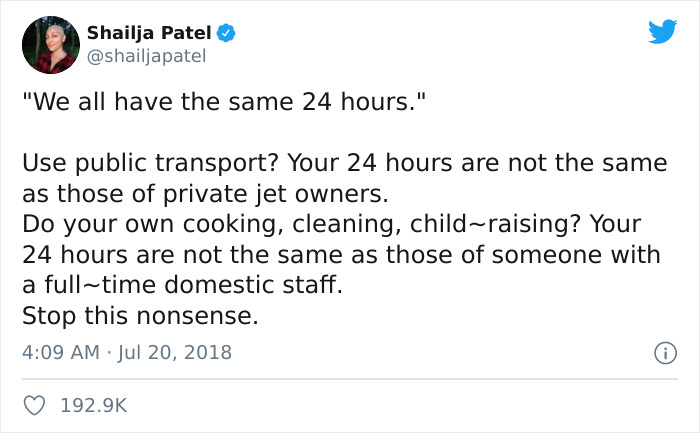
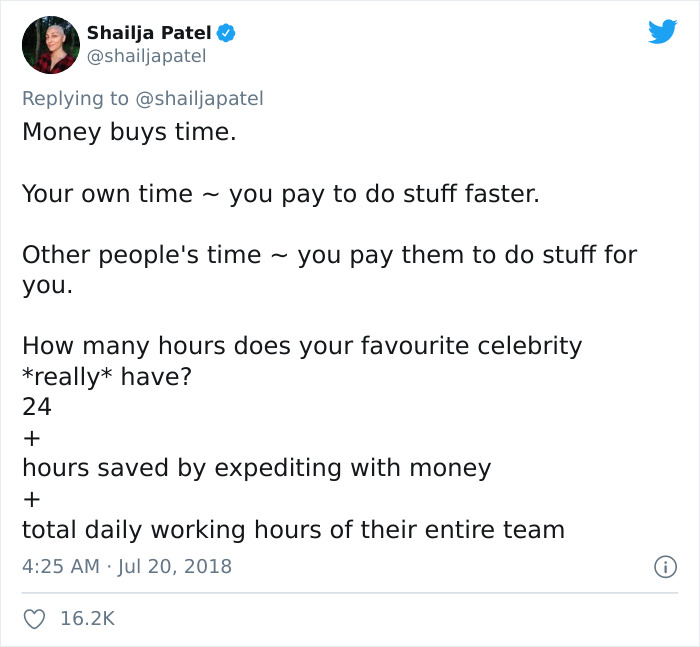
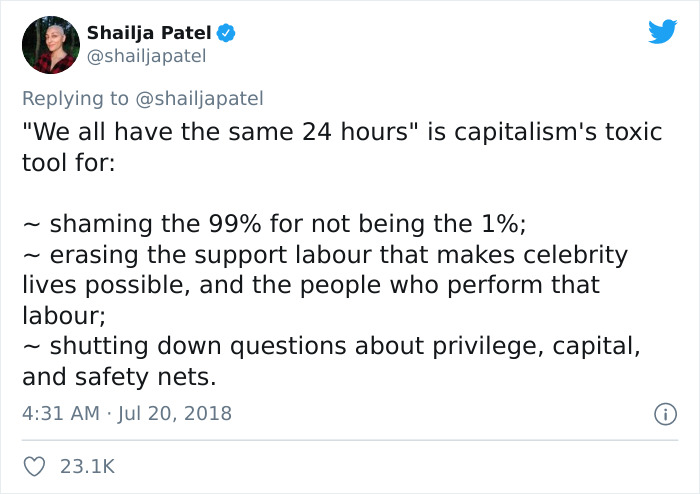
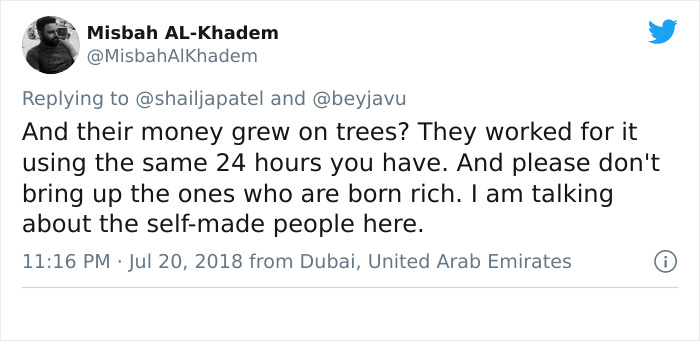
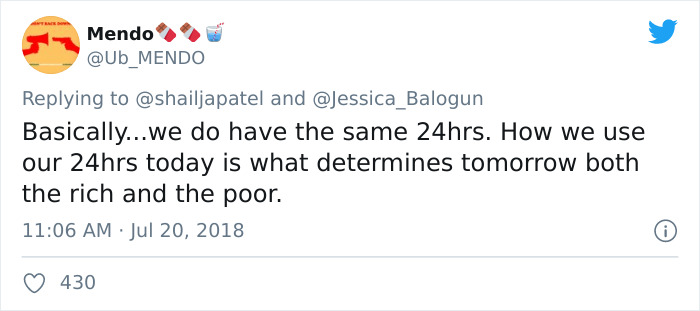
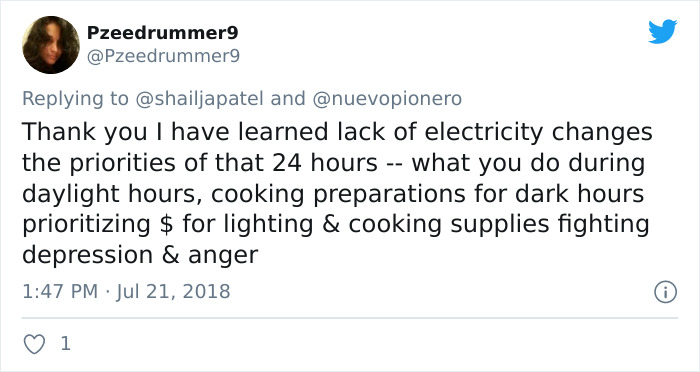
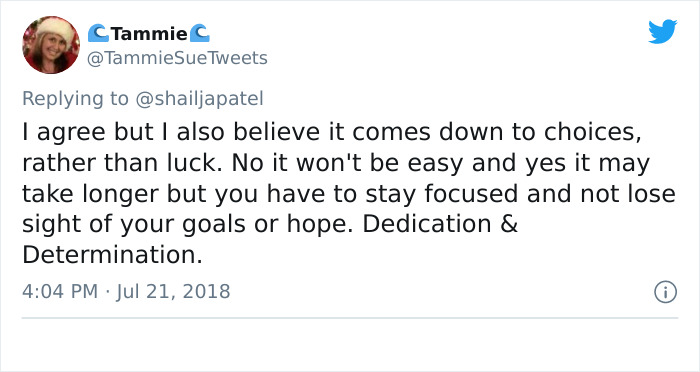
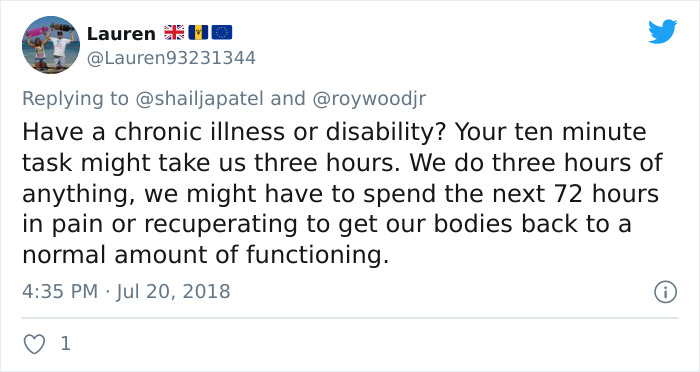
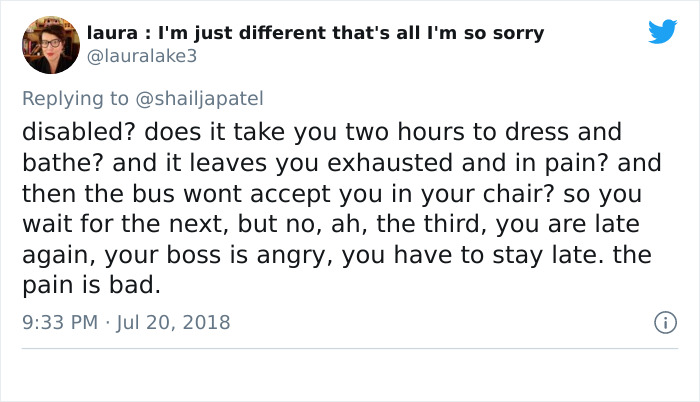
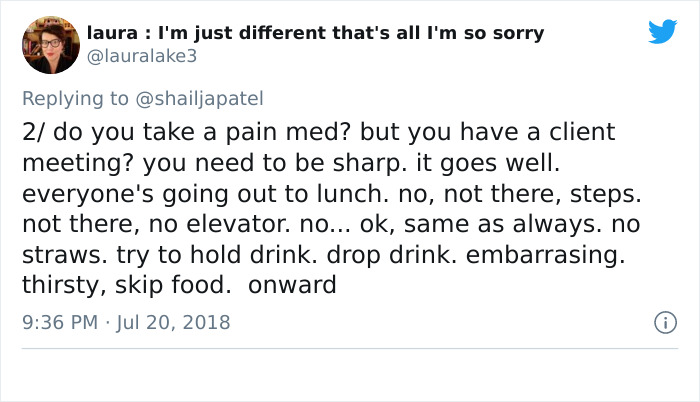
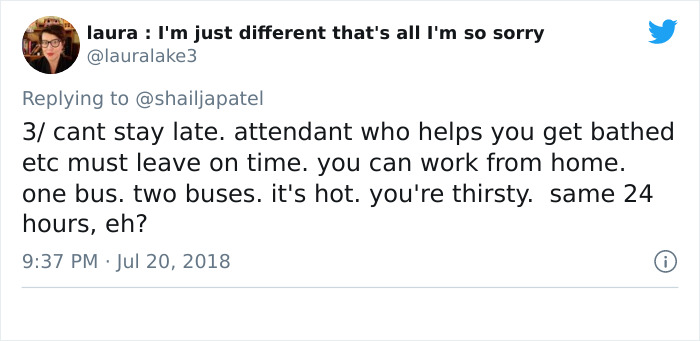
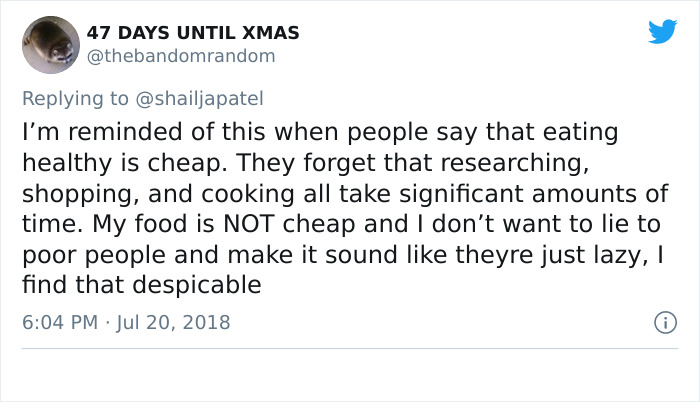
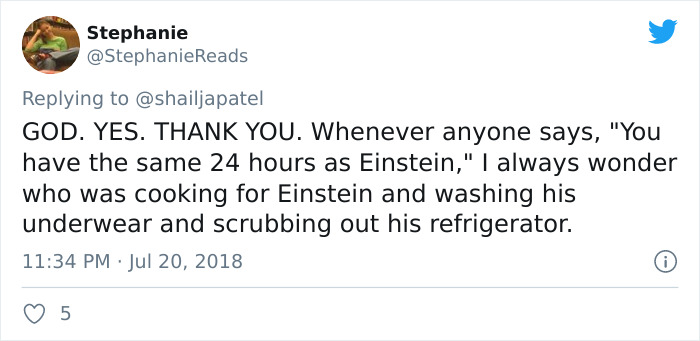
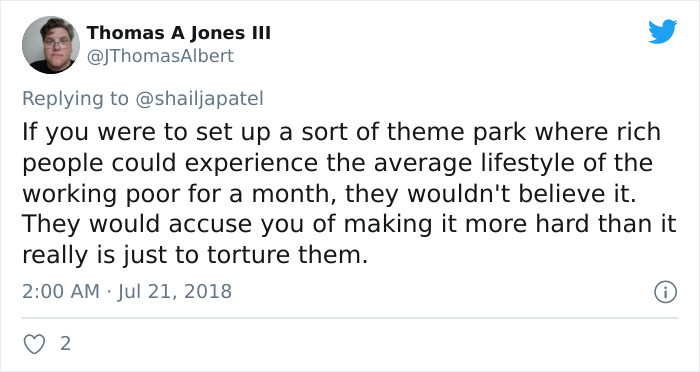



179
65